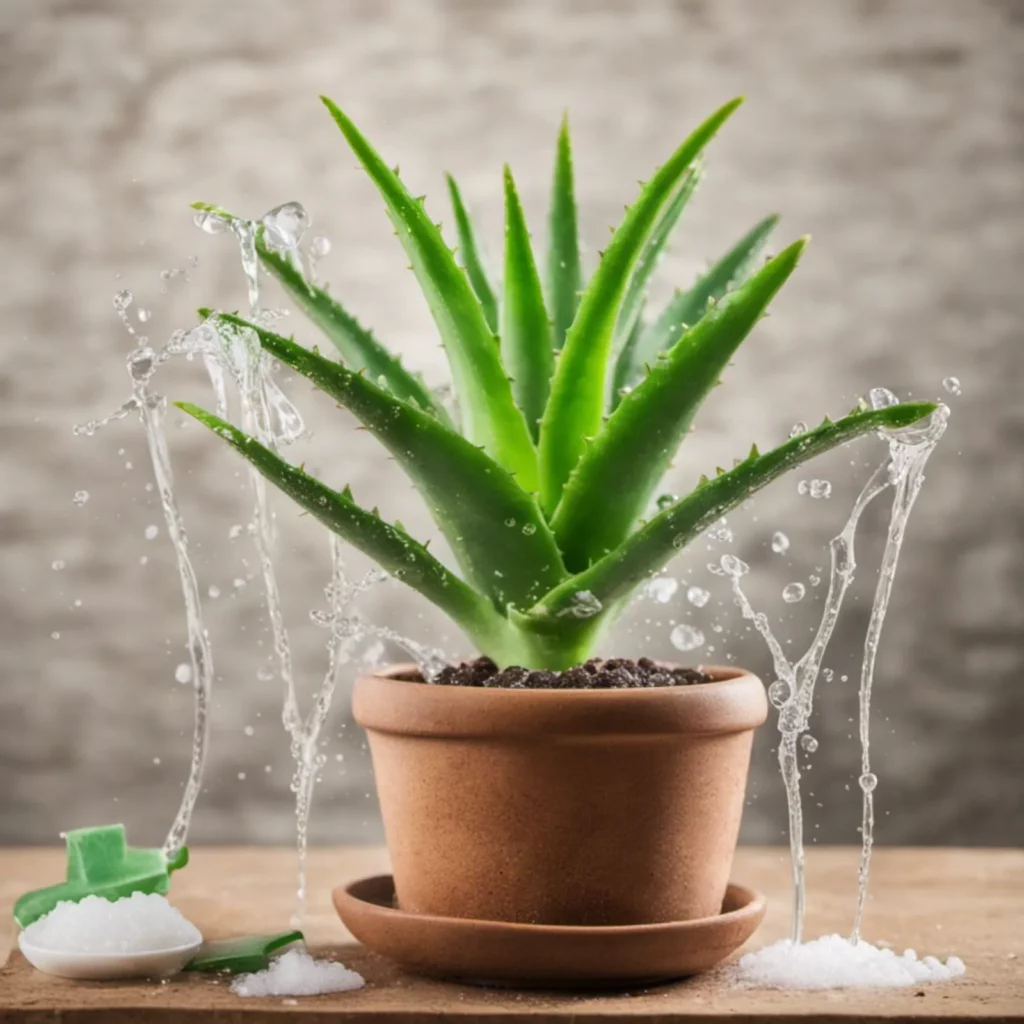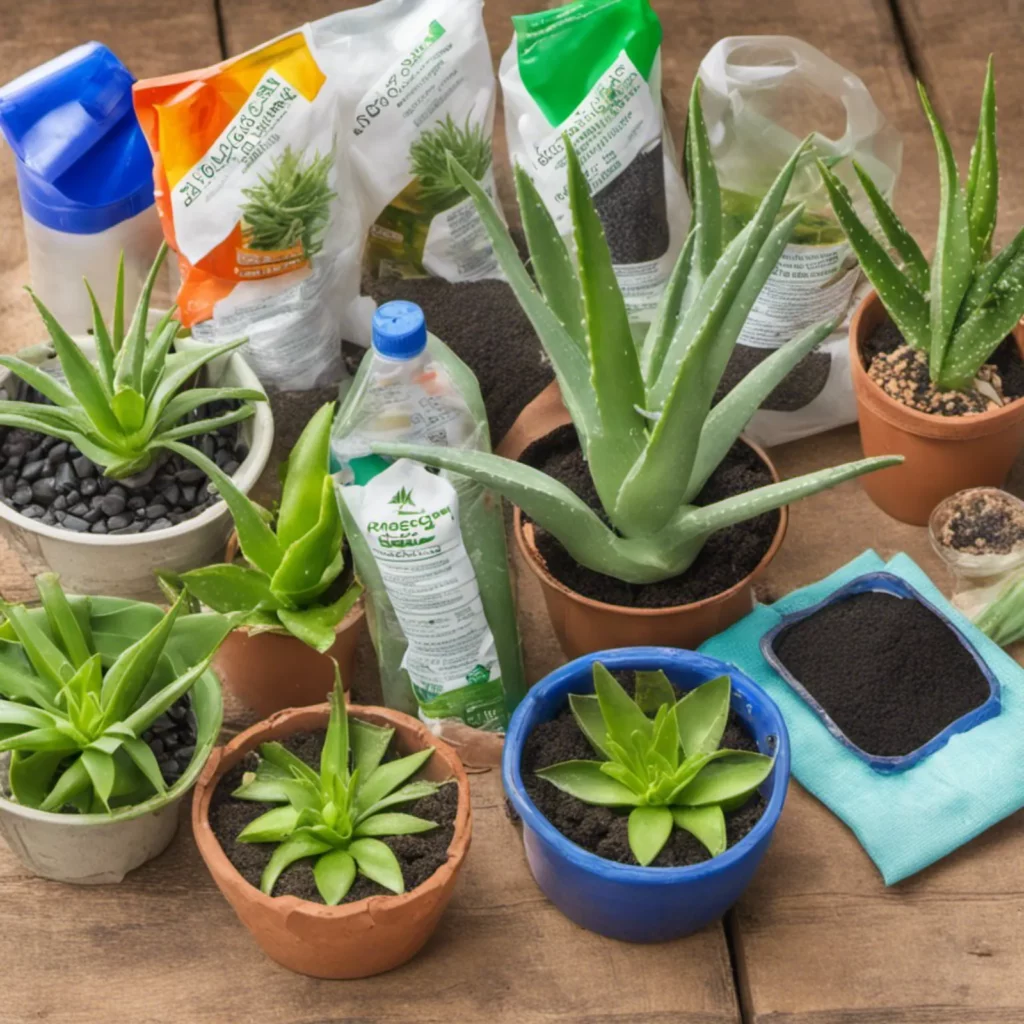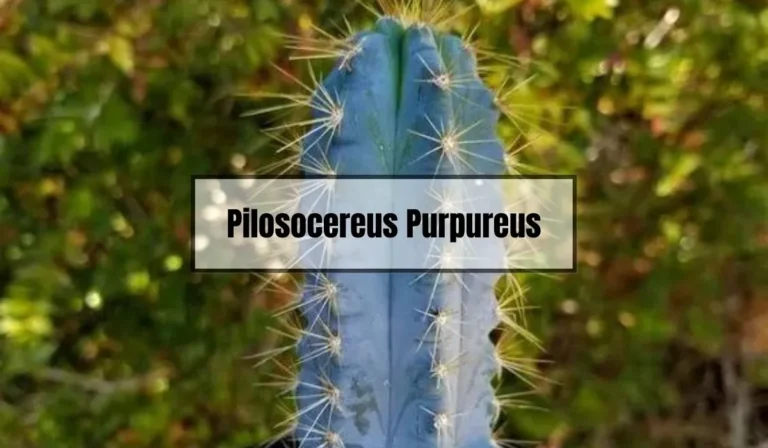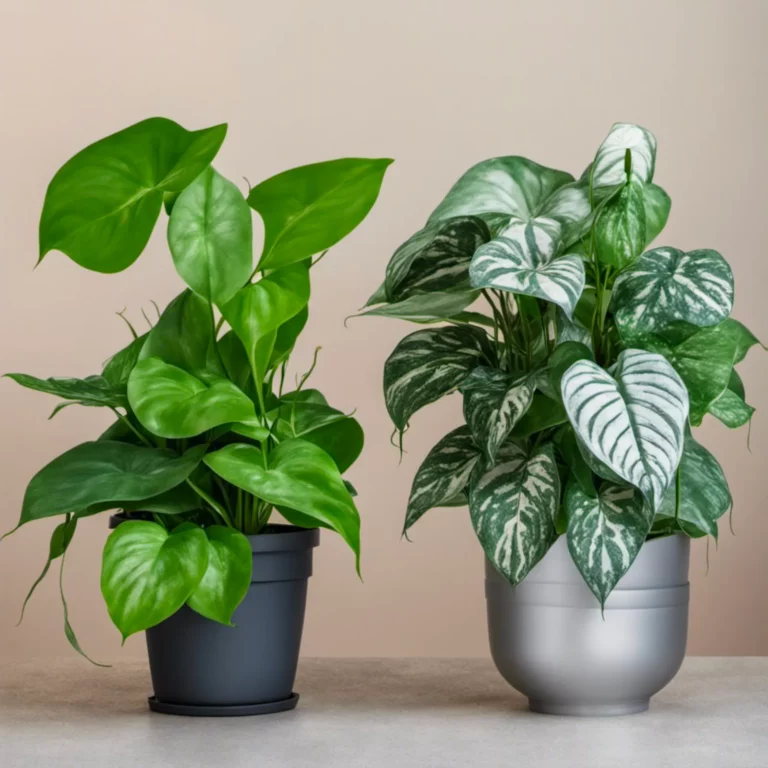The Sweet Solution: Is Sugar Water Good for Aloe Vera Plants?
As a plant parent, you want to make sure your aloe vera plant is healthy and thriving. One question that often comes up is whether sugar water is good for aloe vera plants. The answer is yes, sugar water can help perk up your plant and promote new growth. However, it’s important to use sugar water in moderation and not as a regular watering method.
Sugar water can be a useful tool to revive a wilted aloe vera plant. It provides a quick source of energy to the plant and can help it overcome transplant shock.
However, too much sugar can be harmful to the plant and cause damage to its roots. It’s recommended to use sugar water once every few weeks and only when your plant needs a little boost.
Key Takeaways
- Sugar water can help revive a wilted aloe vera plant, but should be used in moderation.
- Too much sugar can be harmful to the plant and cause damage to its roots.
- Sugar water should only be used occasionally, and other methods of aloe vera care should be explored for regular maintenance.

Is Sugar Water Good for Aloe Vera Plants?
The answer is yes. Are you worried about the health of your aloe vera plant? Do you want to perk it up and keep it looking healthy?
If yes, then you might have heard about using sugar water for your aloe vera plant. But, is sugar water really good for aloe vera plants? Let’s find out.
What is Sugar Water?
Sugar water is a mixture of sugar and water. It is commonly used as a sweetener for drinks and desserts. However, some gardeners also use sugar water as a plant food for their plants.
How Can Sugar Water Help Aloe Vera Plants?
Sugar water can help your aloe vera plant in the following ways:
- Absorbing More Water: Aloe vera plants are succulents, which means they store water in their leaves. Sugar water can help them absorb more water from the soil, which can keep them hydrated and healthy.
- Boosting Photosynthesis: Sugar is a source of energy for plants. When you add sugar to the water, it can provide your aloe vera plant with the energy it needs to carry out photosynthesis. This can help your plant grow and produce more leaves.
- Overcoming Transplant Shock: If you have recently transplanted your aloe vera plant, it may go into shock. Adding sugar water to the soil can help your plant recover from transplant shock and grow faster.
How to Use Sugar Water for Aloe Vera Plants?
If you want to use sugar water for your aloe vera plant, here’s what you need to do:
- Mix one tablespoon of sugar in one gallon of water.
- Water your aloe vera plant with the sugar water once a month.
- Make sure the soil is moist but not waterlogged.
- Monitor your plant for any signs of overwatering or underwatering.
Impact of Sugar Water on Aloe Vera Growth

Are you wondering if sugar water is good for your aloe vera plant? The answer is yes! Sugar water can help to perk up your plant and promote new growth. Here’s how sugar water impacts aloe vera growth:
- Provides Energy: Sugar water provides energy to the plant, which helps it to grow faster. The sugar in the water is broken down by the plant and used as a source of energy for photosynthesis.
- Promotes Root Growth: Sugar water can also promote root growth in aloe vera plants. The sugar in the water stimulates the growth of beneficial microorganisms in the soil, which in turn helps to improve the health of the roots.
- Reduces Transplant Shock: Sugar water can help reduce transplant shock in aloe vera plants. When you transplant a plant, it can go into shock and stop growing for a while. The sugar in the water helps to provide the plant with the energy it needs to recover from the shock and start growing again.
However, it’s important to note that sugar water should be used in moderation. Too much sugar can actually be harmful to your plant. Here are some tips for using sugar water on your aloe vera plant:
- Use in Moderation: Use sugar water in moderation. A good rule of thumb is to use it once a month or less.
- Dilute the Sugar: Dilute the sugar in water. Use one tablespoon of sugar per gallon of water.
- Water Thoroughly: Water your plant thoroughly with sugar water. Make sure that the water flows completely through the soil and out the bottom of your container.
- Avoid Leaves: Avoid getting sugar water on the leaves of your plant. This can attract insects and cause damage to the leaves.
By following these tips, you can use sugar water to promote the growth of your aloe vera plant.
When Might Sugar Water Benefit Aloe Vera Plants?
While sugar water may not be the best option for everyday use, it can be helpful in specific scenarios. For instance, adding sugar to water can help support a dying plant in the short term by providing a small boost to its naturally occurring sugars. It can also encourage microbial activity in the soil, which can help support the plant quickly.
Additionally, sugar water can help keep cut flowers fresh by adding it to the stems. Therefore, if you’re looking to get more blooms from your aloe vera plants, you may want to try adding a bit of sugar water to the soil occasionally.
However, it’s crucial to use sugar water sparingly and with caution. Experts recommend diluting sugar water, so it’s not too concentrated and not using it for every watering session. It’s also essential to ensure that the soil is well-drained and that the plant is getting the proper nutrients from the soil to avoid root rot.
Alternatives to Sugar Water for Aloe Vera

While sugar water can be beneficial for your aloe vera plant, it is not the only option available. Here are a few alternatives to sugar water that you can try:
1. Aloe Vera Fertilizer
Aloe vera fertilizer is specifically designed to provide the necessary nutrients for your plant’s growth. It contains a balanced mix of nitrogen, phosphorus, and potassium, which are essential for healthy plant growth.
You can find aloe vera fertilizer at your local garden center or online. Follow the instructions on the package for best results.
2. Compost Tea
Compost tea is a natural fertilizer that can help improve the soil quality around your aloe vera plant. It is made by steeping compost in water for several days, then straining out the solids.
The resulting liquid is rich in nutrients and beneficial microorganisms that can help your plant thrive. To make compost tea, simply fill a bucket with water, add a few scoops of compost, and let it steep for several days. Strain out the solids before using.
3. Epsom Salt
Epsom salt is a natural mineral that can help improve the health of your aloe vera plant. It contains magnesium, which is essential for healthy plant growth.
To use Epsom salt, simply dissolve a tablespoon of it in a gallon of water and use it to water your plant once a month.
4. Fish Emulsion
Fish emulsion is a natural fertilizer that is made from fish waste. It is rich in nitrogen, which is essential for healthy plant growth. To use fish emulsion, simply dilute it according to the instructions on the package and use it to water your plant once a month.
Remember, while sugar water can be beneficial for your aloe vera plant, it is not the only option available. Try one of these alternatives to see which works best for your plant.
Experimenting with Aloe Vera Care
So, you’ve heard that sugar water can help perk up your aloe vera plant and keep it looking healthy. But how do you know if it’s actually working? Well, the best way to find out is to experiment with your aloe vera care routine.
Start by keeping track of how often you water your plant and how much sunlight it gets each day. Then, try adding a small amount of sugar water to the soil every few weeks. Keep track of any changes in the plant’s appearance, such as new growth or changes in color.
Another way to experiment with aloe vera care is to try different types of soil. Aloe vera plants prefer well-draining soil, so try mixing in sand or perlite to improve drainage. You can also try adding compost or other organic matter to the soil to improve its nutrient content.
If you notice that your aloe vera plant is not growing as quickly as you’d like, try fertilizing it with a balanced fertilizer. Be sure to follow the instructions on the label carefully, as over-fertilizing can damage the plant.
In addition to experimenting with your aloe vera care routine, it’s also important to keep an eye out for any signs of pests or disease. Common pests that can affect aloe vera plants include mealybugs and spider mites. If you notice any signs of pests, such as white cottony patches or webbing, treat the plant with an insecticidal soap.
Overall, experimenting with aloe vera care can be a fun and rewarding way to learn more about this fascinating plant. By keeping track of your observations and making small changes to your care routine, you can help your aloe vera plant thrive and stay healthy for years to come.
Professional Tips for Aloe Vera Plant Care
Taking care of your aloe vera plant is easy as pie. With just a little bit of effort and attention, you can keep your plant healthy and thriving for years to come. Here are some professional tips for aloe vera plant care:
Sunlight
Aloe vera plants love sunlight, but they can get sunburned if they get too much direct sunlight.
So, it’s best to keep your plant in a bright, sunny spot, but not in direct sunlight. If you’re growing your aloe vera plant indoors, make sure it’s near a window that gets plenty of light.
Watering
Aloe vera plants are succulents, which means they store water in their leaves. So, you don’t need to water them very often. In fact, overwatering can be harmful to your plant.
Water your aloe vera plant only when the soil is completely dry. When you do water your plant, make sure you water it thoroughly, so the water reaches the roots.
Soil
Aloe vera plants need well-draining soil, so they don’t get waterlogged. You can use a commercial cactus or succulent soil mix, or you can make your own by mixing equal parts of sand, perlite, and peat moss.
Fertilizer
Aloe vera plants don’t need a lot of fertilizer, but you can give them a boost by fertilizing them once a month during the growing season (spring and summer). Use a balanced fertilizer, such as a 10-10-10 or 20-20-20 fertilizer, and dilute it to half strength.
Pruning
Aloe vera plants don’t need to be pruned very often, but you can remove any dead or damaged leaves to keep your plant looking neat and tidy. You can also harvest the leaves for their gel, which has many health benefits.
Pests and Diseases
Aloe vera plants are generally pest and disease-free, but they can be susceptible to mealybugs, scale insects, and root rot if they’re overwatered. If you notice any signs of pests or disease, treat your plant with an insecticide or fungicide, or repot it in fresh, well-draining soil.
By following these professional tips for aloe vera plant care, you can keep your plant healthy and happy for years to come. Happy gardening!
FAQs
Can Sugar Water Attract Pests to Aloe Vera Plants?
While there is no evidence that sugar water can attract pests to aloe vera plants specifically, it’s always important to keep an eye out for any signs of infestations.
If you notice any unusual activity around your plants, such as an increase in insects or rodents, it’s best to consult with a pest control expert to find a solution.
Can Sugar Water Cause Root Rot in Aloe Vera Plants?
Yes, using sugar water on aloe vera plants can cause root rot if used improperly. When sugar water is overused or not diluted enough, it can attract harmful bacteria and fungi that can lead to root rot. Therefore, it’s essential to use sugar water sparingly and to ensure that the soil is well-draining to avoid this issue.
Can Sugar Water Harm the Soil in Which Aloe Vera Plants Grow?
Yes, overusing sugar water can cause harm to the soil in which aloe vera plants grow. Sugar can build up in the soil, attracting harmful bacteria and fungi that can damage the plant’s roots and lead to soil compaction. Therefore, it’s crucial to use sugar water sparingly and to ensure that the soil is well-aerated to prevent these issues.
Conclusion
In conclusion, using sugar water on aloe vera plants can provide some benefits, but it’s essential to use it sparingly and with caution. While sugar water can provide a quick boost to dying plants and encourage microbial activity in the soil, it can also attract harmful bacteria and fungi, leading to root rot and soil compaction. Therefore, it’s crucial to ensure that the soil is well-draining and that the plant is getting the proper nutrients from the soil to avoid these issues.
There are several alternative pantry staples that you can use as fertilizers for aloe vera plants, such as Epsom salt, eggshells, coffee grounds, and banana peels. It’s always important to do your research before using any fertilizer on your plants and to consult with an expert if you notice any issues with your plants.
Remember, gardening hacks can be a fun and creative way to take care of your plants, but it’s essential to prioritize proper plant care and not rely on specific mixtures or techniques. With the right care and attention, your aloe vera plants can thrive and provide you with numerous benefits, such as air purification and skin-soothing properties. Happy gardening!






